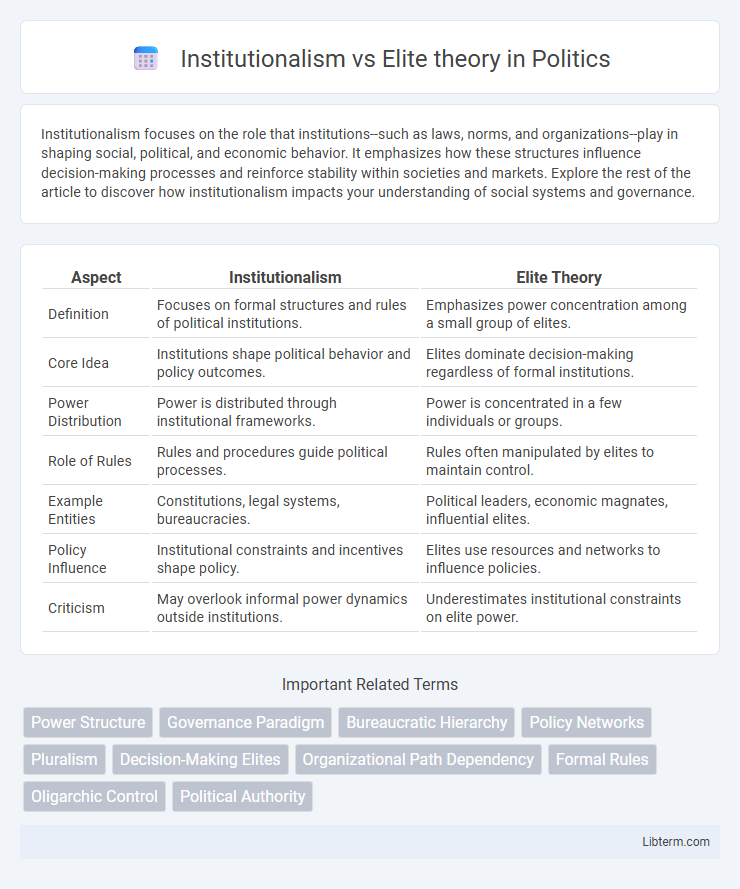Institutionalism focuses on the role that institutions--such as laws, norms, and organizations--play in shaping social, political, and economic behavior. It emphasizes how these structures influence decision-making processes and reinforce stability within societies and markets. Explore the rest of the article to discover how institutionalism impacts your understanding of social systems and governance.
Table of Comparison
| Aspect | Institutionalism | Elite Theory |
|---|---|---|
| Definition | Focuses on formal structures and rules of political institutions. | Emphasizes power concentration among a small group of elites. |
| Core Idea | Institutions shape political behavior and policy outcomes. | Elites dominate decision-making regardless of formal institutions. |
| Power Distribution | Power is distributed through institutional frameworks. | Power is concentrated in a few individuals or groups. |
| Role of Rules | Rules and procedures guide political processes. | Rules often manipulated by elites to maintain control. |
| Example Entities | Constitutions, legal systems, bureaucracies. | Political leaders, economic magnates, influential elites. |
| Policy Influence | Institutional constraints and incentives shape policy. | Elites use resources and networks to influence policies. |
| Criticism | May overlook informal power dynamics outside institutions. | Underestimates institutional constraints on elite power. |
Understanding Institutionalism: Core Concepts
Institutionalism emphasizes the role of formal structures, rules, and norms in shaping political behavior and outcomes, highlighting how institutions create stability and guide interactions within societies. It focuses on how institutions evolve over time, embedding values and practices that influence policy decisions and power distribution. This approach contrasts with Elite Theory by stressing systemic frameworks rather than concentrating solely on the influence of a select group in controlling political power.
Elite Theory: Key Principles and Assumptions
Elite Theory posits that a small, cohesive group of powerful individuals holds the majority of political and economic power, shaping policies to serve their interests while marginalizing the broader population. It assumes that elites are unified by shared backgrounds, wealth, and social networks, enabling them to maintain control over institutions and resources. This theory contrasts with Institutionalism by emphasizing power concentration and elite dominance rather than formal structures or rules.
Historical Origins and Development
Institutionalism traces its origins to the late 19th and early 20th centuries, emphasizing the formal structures and rules governing political and social organizations, with key contributions from scholars like Thorstein Veblen and John R. Commons. Elite theory emerged prominently in the early 20th century through the works of Vilfredo Pareto and Gaetano Mosca, positing that a small, cohesive elite holds disproportionate power over society and its institutions. Both theories evolved through historical contexts of industrialization and democratization, influencing contemporary analyses of power distribution and institutional dynamics.
Structure of Power: Institutions vs. Elites
Institutionalism emphasizes the structure of power distributed within formal organizations, rules, and norms that shape political behavior and decision-making processes, ensuring stability and predictability. Elite theory argues power is concentrated in the hands of a small, cohesive group of elites who dominate critical institutions and influence policy outcomes to maintain their privileged status. The core divergence lies in institutionalism viewing power as embedded in established systems, while elite theory centers on the dominance of individual or group actors controlling those systems.
Decision-Making Processes in Institutions
Institutionalism emphasizes how formal rules, procedures, and established norms within institutions shape decision-making processes by promoting stability and consistency. Elite theory argues that decision-making is dominated by a small group of influential actors or elites who control key resources and wield disproportionate power, often bypassing institutional constraints. The contrast highlights how institutional frameworks either constrain or are overridden by elite influence in shaping policy outcomes.
The Role of Elites in Policy Formation
Elites play a pivotal role in policy formation by shaping agendas, influencing decision-making, and controlling key resources within government and institutions. Institutionalism emphasizes the structured roles and rules within formal organizations that guide elite behavior and policy outcomes. In contrast, Elite theory highlights the concentration of power among a small, cohesive group whose interests dominate the policy process regardless of institutional constraints.
Case Studies: Institutionalism in Practice
Institutionalism in practice is evident in case studies like the U.S. Congress, where formal rules and procedures shape legislative behavior and policy outcomes, emphasizing the role of established institutions over individual actors. In contrast, elite theory is illustrated by the influence of corporate leaders and lobbyists in shaping economic policy, demonstrating how a small group consolidates power regardless of institutional constraints. These case studies reveal institutionalism's focus on systemic frameworks guiding political processes, while elite theory highlights power concentration within select groups.
Examples of Elite Influence in Governance
Elite theory is exemplified by the dominance of corporate leaders and wealthy individuals in shaping U.S. economic policies, such as the influence of major Wall Street firms on financial regulation. Institutionalism, however, highlights the role of formal structures like the U.S. Congress and judiciary in balancing competing interests through established procedures and rules. Examples of elite influence include the revolving door between government agencies and defense contractors, demonstrating how elites exert power beyond institutional constraints to affect governance outcomes.
Strengths and Critiques of Institutionalism
Institutionalism strengthens political analysis by emphasizing formal structures and rules that shape behavior, providing clarity on how institutions influence decision-making and policy outcomes. It highlights the durability and stability of political systems by focusing on procedures and norms embedded in organizations. Critics argue institutionalism can be overly rigid, often underestimating informal power dynamics and elite influence that affect institutional operations beyond formal rules.
Elite Theory: Criticisms and Limitations
Elite theory faces criticism for its oversimplification of power dynamics, often portraying society as dominated by a small, homogeneous group, which neglects the complexity of social structures. It tends to underestimate the role of institutions, public opinion, and pluralistic interactions in influencing policy and decision-making processes. Critics also argue that elite theory lacks empirical support, as it frequently fails to account for instances where power is more dispersed or contested within societies.
Institutionalism Infographic

 libterm.com
libterm.com